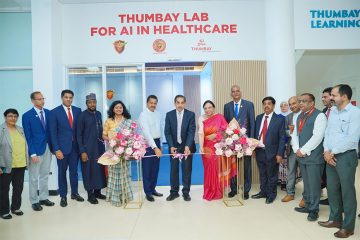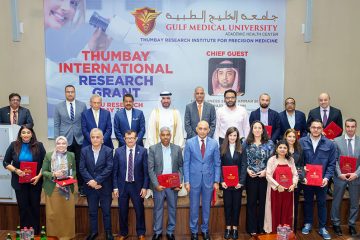- The course is a part of Centre of Humanitarian Education, which is being led at GMU in collaboration with IFRC, to roll out UAE’s first cohort of First Aid Program Trainers
Gulf Medical University (GMU), along with International Federation of Red Cross and Red Crescent Societies (IFRC), on Wednesday February 9, 2022, celebrated the completion of the first batch of its professional certification program in first-aid training – Training of Trainers (ToT). The four-week program is designed for clinical lecturers, professors, doctors and medical students, to equip them with international guidelines and first aid training.

The first-of-its kind program in United Arab Emirates-which is an initiative of Centre of Humanitarian Education where GMU and IFRC have collaborated to introduce fundamental humanitarian principles, engage medical students and university staff in humanitarian action-saw the enrollment of 8 university participants in addition to other 20 medical students to focus on developing skills and knowledge, as well as expanding the participants coaching and mentoring abilities that are believed to be critical in supporting first aid trainer candidates.
The program has been designed to provide extensive hands-on and technology-based learning experience, along with online lectures, assignments, and interactive sessions to promote humanitarian principles in the community. Commenting on the unique initiative, Dr. Fawzi Amin, Head of IFRC Gulf Country Cluster Delegation, said, “We are extremely happy to collaborate with one of the premiere institutions of medicine in UAE, GMU, to offer a specialized certificate in first-aid practices to medical students, doctors and lecturers who are capable of making significant contributions to the community on the whole. It is the need of the hour to promote humanitarian learning in healthcare to create a model youth force in the country that will be equipped with all the basic skills and knowledge to fight any emergency crisis as per international standards. Not only will our youth be prepared to fight any crisis, but they will also be able to provide medical assistance to their family and people in their community.”
As part of the evaluation process, candidates were also assessed on teaching experience, which consists of providing different sequences to medical students, in a dynamic way, avoiding displaying presentation. The teaching team could also review the criteria on live by distance and evaluate participants on their communication, use of technics and content. On completion of the course, all the participants were awarded with certificates. Going forward, IFRC plans to introduce two more courses titled: (a) Certification in International Humanitarian Law ad (b) Safer Access. The courses aim to enhance the effectiveness of humanitarian services by societies.
Chancellor of the GMU, Hossam Hamdy said, “The certificate course will be extremely important to tackle any future medical emergencies. We are enthusiastic that the first center in UAE for the certification has been set up in the premises of our university. This course will be able to cater to a wide spectrum of audience, including students, faculty, health professionals, that can train and teach others on the subject of first-aid. There’s is an increasing need of health assistants in our community who are equipped with the skill and knowledge of international best practices to provide assistance before the patient reaches a healthcare facility. We are, therefore, committed to drive community engagement with courses and certifications that can help individuals take up responsibilities in this important field.”



